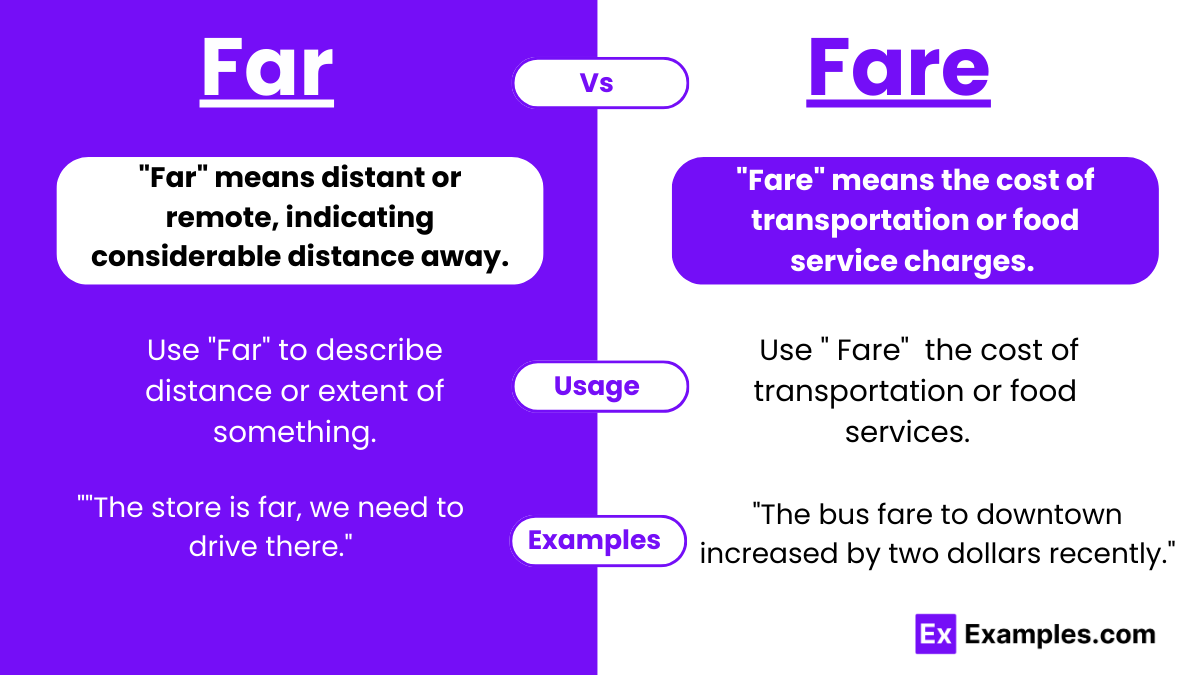Far vs Fare – Meanings, Differences, Usage, Examples
Unlock the intricacies of communication with our comprehensive guide on “Far vs. Fare.” This detailed exploration provides clear distinctions between these commonly confused terms, empowering you to articulate with precision. From everyday conversations to professional writing, understanding the nuances ensures effective communication. With illuminating examples and insightful explanations, this guide equips you to navigate linguistic landscapes confidently. Say goodbye to confusion and elevate your communication prowess today!
Far vs Fare – Meanings
- “Far” typically refers to distance or extent. It’s commonly used to measure physical space, indicating the distance between two points or the extent of an action. For example, one might ask, “How far is the nearest town?” or say, “We’ve come a long way,” to denote a considerable distance traveled.
- “Fare,” on the other hand, pertains to the cost of transportation or food. It represents the monetary exchange required for services rendered, such as paying for a bus ticket or settling a restaurant bill. Understanding these nuances is essential for clear and effective communication in various contexts.
Summary
How To Pronounce Far and Fare
How to pronounce Far
- “Far” is pronounced as /fɑːr/.
- Start with the “f” sound, similar to blowing out a candle.
- Move your mouth into a rounded shape for the “a” sound, as in “father.”
How to pronounce Fare
- “Fare” is pronounced as /fɛər/.
- Begin with the “f” sound, produced by lightly touching your top teeth to your bottom lip.
- Transition smoothly into the “air” diphthong, blending the “e” and “r” sounds.
Differences Between Far and Fare
| Aspect | Far | Fare |
|---|---|---|
| Meaning | Refers to distance or extent. | Refers to the cost of transport or food. |
| Usage | Used to measure physical space or denote the extent of an action. | Represents the monetary exchange required for services like transportation or dining. |
| Example | “How far is the nearest town?” | “What’s the fare for the bus ride?” |
| Example | “We’ve come a long way.” | “The fare for the meal was reasonable.” |
| Pronunciation | Pronounced as /fɑːr/. | Pronounced as /fɛər/. |
How to Remember the Differences Between “Far” and “Fare”
- Visualize Distance: Associate “far” with stretching your arms out as far as possible, indicating distance.
- Think of a Bus Fare: Imagine handing over money (fare) to a bus driver, connecting “fare” with transportation costs.
Tricks to Remember the Differences Between “Far” and “Fare”
- Use Mnemonics: Create a phrase like “Far for distance, Fare for payment” to solidify the distinction.
- Associate with Travel: Picture yourself traveling a long distance (far) and paying for transportation (fare) to reinforce their meanings.
When to Use Far and Fare
Usage of “Far”
- When discussing distance or extent.
- When indicating physical space or the extent of an action.
- Example: “How far is the nearest town?”
- Example: “We’ve come a long way.”
Usage of “Fare”
- When referring to the cost of transportation or food.
- When discussing the monetary exchange required for services like transportation or dining.
- Example: “What’s the fare for the bus ride?”
- Example: “The fare for the meal was reasonable.”
Far and Fare Examples
Examples of “Far“
- The nearest gas station is far from our current location.
- How far is the airport from your house?
- We walked far into the forest before setting up camp.
- The mountain peak seemed so far away from where we stood.
- She traveled far and wide to explore different cultures.
Examples of “Fare”
- What’s the fare for a taxi ride to downtown?
- I need to check the train fare before booking my ticket.
- The fare for the ferry to the island was surprisingly affordable.
- We split the fare for the Uber ride between the three of us.
- The restaurant’s lunch fare includes an appetizer, main course, and dessert
Synonyms For Far and Fare
| Far | Fare |
|---|---|
| Distant | Price |
| Remote | Charge |
| Faraway | Cost |
| Long-distance | Tariff |
| Extensive | Fee |
Exercise
Instructions: Fill in the blanks with the appropriate word, “far” or “fare,” to complete each sentence correctly.
- The _______________ for the bus ride downtown was surprisingly low.
- How _______________ did you walk this morning?
- The _______________ from here to the airport is quite expensive.
- We traveled _______________ to attend the conference.
- What’s the _______________ for a round-trip ticket to New York City?
- The restaurant’s lunch _______________ includes a drink and a dessert.
- She has come a _______________ way since she started her career.
- The _______________ for the taxi ride to the hotel was outrageous!
Answers:
- fare
- far
- fare
- far
- fare
- fare
- far
- fare
FAQ’S
Is it fared better or faired better?
The correct phrase is “fared better.” It means to have performed or progressed in a more favorable manner compared to before.
Does fare mean travel?
Yes, “fare” can mean travel, particularly in the context of paying for transportation services, such as bus fare or train fare.
Did you fare well or fair well?
The correct phrase is “fared well.” It indicates that someone performed satisfactorily or experienced success in a particular situation or endeavor.
Is it fare or fair for carnival?
It is “fair” for carnival. “Fair” refers to an event or gathering where various goods, games, and amusements are available for public enjoyment, commonly seen in carnivals and festivals.




